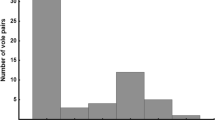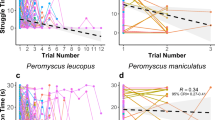Abstract
Offspring of wild mice trapped in Texas and Colorado were raised under standard laboratory conditions and tested as adults for activity, defecation, climbing latency, and jumping in the open field; running-wheel activity; nest-building behavior; temperature preference; and cold and heat stress. Differences among the two Texas samples and the Colorado sample were found for all but the last two measures. A preliminary attempt was made to assign these behavioral differences to genetic drift or natural selection on the basis of intraregionalvs. interregional differences among the groups. Comparison of data obtained from wild mice to data from inbred and random-bred mice run in the same laboratory with the same apparatuses suggested that wild mice jump much more in the open field and are considerably more active in the open field and in the running wheel than inbred and random-bred laboratory strains of mice.
Similar content being viewed by others
References
Brubaker, I., (1971). Behavior genetic study of race and deme differences inMus musculus. Unpublished Ph.D. dissertation. University of Texas.
Bruell, J. (1970). Behavioral population genetics and wildMus musculus. In Lindzey, G., and Thiessen, D. D. (eds.),Contributions to Behavior Genetic Analysis: The Mouse as a Prototype, Appleton-Century-Crofts, New York, pp. 261–291.
King, J. A., Maas, D., and Weisman, R. G. (1964). Geographic variation in nest size among species ofPeromyscus.Evolution 18: 230–234.
Lee, C., and Wong, P. (1970). Temperature effect and strain differences in the nest-building behavior of inbred mice.Psychon. Sci. 20: 9.
Lynch, C., and Hegmann, J. P. (1972). Genetic differences influencing behavioral temperature regulation in small mammals. I. Nesting byMus musculus.Behav. Genet. 2: 43–54.
Manosevitz, M. (1970). Early environmental enrichment and mouse behavior.J. Comp. Physiol. Psychol. 71: 459–466.
Manosevitz, M., and Joel, U. (1973). Behavioral effects of environmental enrichment in random-bred mice.J. Comp. Physiol. Psychol. 85: 373–382.
Manosevitz, M., and McCanne, T. R. (1973). The effects of early food deprivation on mouse behavior.J. Comp. Physiol. Psychol. 83: 314–323.
Manosevitz, M. and Montemayor, R. J. (1972). Interaction of environmental enrichment and genotype.J. Comp. Physiol. Psychol. 79: 67–76.
Mayr, E. (1970).Populations. Species, and Evolution, Harvard University Press, Cambridge, Mass.
Selander, R. K. (1970). Behavior and genetic variation in natural populations.Am. Zoologist 10: 53–66.
Selander, R. K., and Yang, S. Y. (1970). Biochemical genetics and behavior in wild house mouse populations. In Lindzey, G., and Thiessen, D. D. (eds.).Contributions to Behavior Genetic Analysis: The Mouse as a Prototype, Appleton-Century-Crofts, New York, pp. 293–334.
Selander, R. K., Yang, S. Y., and Hunt, W. G. (1969). Polymorphism in esterases and hemoglobin in wild populations of the house mouse (Mus musculus). InStudies in Genetics. University of Texas Publication No. 6918, Austin, Texas.
Smith, R. H. (1972). Wildness and domestication inMus musculus: A behavioral analysis.J. Comp. Physiol. Psychol. 79: 22–29.
Author information
Authors and Affiliations
Additional information
This research was supported by National Science Foundation Grant GU-1598 and National Institute of Mental Health Grant NH-16899.
Rights and permissions
About this article
Cite this article
Plomin, R.J., Manosevitz, M. Behavioral polytypism in wildMus musculus . Behav Genet 4, 145–157 (1974). https://doi.org/10.1007/BF01065755
Received:
Accepted:
Issue Date:
DOI: https://doi.org/10.1007/BF01065755




